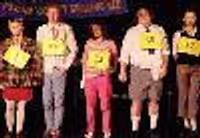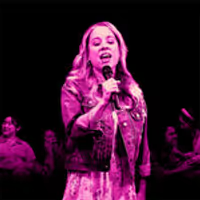JRB's THE CONNECTOR at MCC will star Scott Bakula, Jessica Molaskey, Ben Levi Ross, & more
#75JRB's THE CONNECTOR at MCC will star Scott Bakula, Jessica Molaskey, Ben Levi Ross, & more
Posted: 2/9/24 at 11:59am
JRB has not been a huge success on broadway. Probably the best financial move for him would be to have a hit off broadway run. Make a cast recording and then make money licensing it out.
guitarperson
Swing Joined: 1/14/06
#76JRB's THE CONNECTOR at MCC will star Scott Bakula, Jessica Molaskey, Ben Levi Ross, & more
Posted: 2/10/24 at 1:20pm
Saw this last night and thought it was fantastic--don't understand the mixed reviews! Certainly my favorite score I've heard in a long time. Highly recommend going to see it.
MemorableUserName
Broadway Legend Joined: 3/27/19
#77JRB's THE CONNECTOR at MCC will star Scott Bakula, Jessica Molaskey, Ben Levi Ross, & more
Posted: 2/10/24 at 4:53pm
WSJ review dropped online Thursday/in print Friday. Isherwood is mixed (to negative?)
‘The Connector’ Review: Periodical Period Piece
https://www.wsj.com/articles/the-connector-review-periodical-period-piece-7f861eaa
"But the show lacks a compelling emotional core; I was glad that the writers resisted the easy device of having Ethan and Robin become lovers, but the story of Ethan’s rise isn’t enthralling, especially as he grows less sympathetic and his motivations—other than ambition—remain opaque. While Mr. Brown writes nicely shaped melodies and often smart lyrics—he is also the adept conductor—“The Connector” may strike non-journalists as being dry as newsprint, aimed too squarely at the media-savvy. If you don’t appreciate allusions to George Plimpton, Tom Wolfe and Gay Talese, you are likely to be at sea. (Strangest line: Ethan describing Robin’s writing as being a “combination of Eudora Welty and Janet Malcolm.” Oh, really?)
And on occasion there is a disjunction between the music and the story, notably in the show’s most rousing song, a choral number led by Ethan about the “Wailing Wall,” describing the subject of Ethan’s latest story. It is difficult to square the soaring music with our growing knowledge of his potential malfeasance.
The show is set in the mid-to-late 1990s, now quaintly known as “the print era,” which is roughly the period when the scandal surrounding the New Republic writer Stephen Glass erupted; he seems a clear inspiration for Ethan.
But in the final song Mr. Brown makes an overt attempt to tether the story to our current age, as Ethan sings: “We believe what we believe, and all we want is someone to confirm it. / We believe what we believe. / Surround ourselves with people who believe the way we do.” Perhaps true, or partly so, but the idea does not really have a connection to Ethan’s story, and it is also a talking point so regularly cited that it has become a banality."
#78JRB's THE CONNECTOR at MCC will star Scott Bakula, Jessica Molaskey, Ben Levi Ross, & more
Posted: 2/10/24 at 7:11pm
I’m shocked that both Isherwood and Jesse Green point out the Wailing Wall song as a moment that doesn’t work. To me, it is when the themes of the piece and the plot really converged and was the most thrilling musical moment of the show. Green also mentioned the show being void of psychology - which I couldn’t disagree with more.
Saw it this afternoon and loved it. It’s a piece that rewards patience. I found myself walking out of the theater connecting all of the previous moments of the show in light of the final moments. I thought it worked wonderfully.
JackSDawkins123
Swing Joined: 11/29/23
#79JRB's THE CONNECTOR at MCC will star Scott Bakula, Jessica Molaskey, Ben Levi Ross, & more
Posted: 2/12/24 at 3:19am
I’m new to this, so am upfront acknowledging I’m wondering how some of this message board works.
Like kidmanboy, I saw this show this afternoon and loved it.
I then read the reviews, and this message board thread.
MemorableUserName: You went to the second preview of this musical on Saturday night, January 13th, about a month ago, and then you articulately and clearly posted the next day about why you didn’t like it, and have posted about it 13 more times, by my count, since.
7 of your 14 posts are helpful links to reviews, sometimes accompanied by quotes or passages you’ve selected.
I noticed something when reading the reviews, and then it really stood out when I looked at the reviews you’ve linked to…
70% of the reviews I could find (14) are written by men.
30% of the reviews I could find (6) are written by women.
Given that a major theme of this musical is gender disparity in non-fiction journalism, I found that interesting, especially since the musical is set in the 1990s, but here we are in 2024, and that’s a big gap.
You linked to eight reviews: 7 by men, 1 by a woman. (You didn’t quote from the 4 star review by the woman, but did quote from the 3 star review by a man in the same post of yours.)
I’m wondering if you made a conscious choice, or was it accidental that you decided to highlight and amplify male reviews (and specifically mixed-to-negative ones at that), while ignoring or marginalizing the female reviewers who, as it turns out, were far more positive, almost uniformly so.
I’ll include links to the 6 reviews by women I came across, for convenience:
Time Out (4 out of 5 stars)
New York Theatre Guide (4 out of 5 stars)
NY Stage Review (4 out of 5 stars)
Exeunt NYC.com
New Haven Independent
NY Sun
Thanks!
GottaGetAGimmick420
Broadway Star Joined: 12/9/23
#80JRB's THE CONNECTOR at MCC will star Scott Bakula, Jessica Molaskey, Ben Levi Ross, & more
Posted: 2/12/24 at 6:06am
Wow. That’s the definition of a shill if I’ve ever read one.
MemorableUserName
Broadway Legend Joined: 3/27/19
#81JRB's THE CONNECTOR at MCC will star Scott Bakula, Jessica Molaskey, Ben Levi Ross, & more
Posted: 2/12/24 at 8:25am
JackSDawkins123,
Welcome to the boards. On the BroadwayWorld forums, people have long posted opening night reviews in the shows' threads. I tend to do a lot of them, because I enjoy reading and discussing reviews. You can see the recent Spamalot, I Need That, Harmony, Appropriate, and Oh Mary threads for some examples. My posting in this thread is no different from what I did in any of those. I also posted the NYT and Vulture reviews of the Encores! Once Upon a Mattress production in that thread, both of which happen to have been written by women.
On opening nights I'm usually refreshing Google and the major sites to grab and post reviews as soon as they're published. I generally don't have time to check or find sites outside the major ones. I have to move fast to find the major reviews as soon as they're posted, quickly scan them to determine if they're positive/mixed/negative, pull quotes, post them, and then find the next one, which doesn't leave much time to seek out smaller sites. Google also tends to bring up the major sites on opening night, or the smaller sites post later. In this case most of the reviews from the major sites were by men. I had no say in who wrote them.
As the person pulling quotes from reviews, it probably makes sense that I'm going to pull what strikes me as most interesting. It's dealer's choice. Anyone else is welcome to post any quotes they find more interesting, and often do. Given my response to this show, it shouldn't be surprising that what was most interesting to me were the quotes calling out its flaws.
TimeOut is an outlet I usually post. The reason I didn't post their review because it originally described Ethan as "fresh-outta-Yale" when it's stated numerous times that he went to Princeton, and I found the inaccuracy annoying. They've since corrected it to "fresh-outta-Princeton" though unlike something like the NYT, there's no acknowledgement of the change. I wish I'd taken a screenshot of the original version as proof, but again, there wasn't time. Anyone else was welcome to post it.
I didn't quote from Torre's NY Stage Review review because I was posting so much from Scheck's, which I found more insightful for reasons that had nothing to do with gender.
I don't believe I've ever heard of ExeuntNYC.com or the New Haven Independent, which is why I didn't post them. I just now did my usual Google news search for "The Connector review," sorting by date, to see if they came up, and neither did. So I never would have found them. How nice that you did. I don't believe Playbill or BroadwayWorld posted either of those reviews in their Review Roundups either, so I'm not the only one who didn't find them. The reviews posted by Playbill and BWW are also overwhelmingly by male critics, and BWW misattributes Bernardo's TimeOut review to Adam Feldman, a man. Have you also questioned their motives?
The NY Sun used to be behind a paywall, so I usually don’t post their reviews. Thank you for pointing out Gardner’s review. I would have been happy to share it, and am glad to do so now.
I would hope that I've been around here long enough and established myself as a (frequently annoying, unfortunately abrasive at times) poster for people not to have to question my motives. I think I'm upfront with any biases and hope I come across as someone who is honest, if gratingly so, and can be taken at face value. But I understand that questioning people's motives when one disagrees with their opinions, or their review posting, is probably standard for the world we live in today.
MemorableUserName
Broadway Legend Joined: 3/27/19
#82JRB's THE CONNECTOR at MCC will star Scott Bakula, Jessica Molaskey, Ben Levi Ross, & more
Posted: 2/12/24 at 8:31am
Elysa Gardner in the NY Sun (hat tip to JackSDawkins123) is mostly negative:
A Self-Serious, Heavy-Handed Take on the Business of News, ‘The Connector’ Misses Its Mark
https://www.nysun.com/article/a-self-serious-heavy-handed-take-on-the-business-of-news-the-connector-misses-its-mark
"Over the past year, on and off-Broadway, I’ve seen shows documenting all manner of depravity and destruction, from lynching to mass genocide, but I can’t recall a production as darkly self-serious as “The Connector,” a new musical conceived and directed by Daisy Prince — daughter of the late, great director and producer Hal Prince — in which the crime against humanity in question is … dishonest journalism."
....
"When she’s not dropping names, Robin is prone to whine about how her gender keeps holding her back. “You were born on third base. All you Ivy League boys were born on third base,” she tells Ethan, adding an expletive. “But in your case, I think you truly believe you hit a triple.”
Readers, it is indeed true that a fancy diploma can be a helpful asset in our field, as it can in many. Yet I must add a personal note of protest: I got started as a reporter and critic in the ’90s, contributing to national magazines and newspapers, and I can tell you my editors were tripping over themselves to recruit female talent. Women were certainly star writers at Vanity Fair and the New Yorker by then; one, Tina Brown, had been editor-in-chief for eight years at the former before assuming the same position at the latter back in 1992."
...
"Yet the unabashed bombast that proved more suitable in “Parade” also informs “Connector,” from its opening number, in which Robin, played by Hannah Cruz, sets up the magazine’s story in a shrill, melodramatic belt — as if to assure us that what we’re about to see is of great, great importance. Ms. Cruz’s singing and acting remain especially overzealous, but I suspect Ms. Prince is at least as much to blame as any performer — or any of her creative collaborators, for that matter — for the general heavy-handedness of the piece."
Actinggbugg474
Featured Actor Joined: 9/4/04
#83JRB's THE CONNECTOR at MCC will star Scott Bakula, Jessica Molaskey, Ben Levi Ross, & more
Posted: 2/12/24 at 9:15am
I saw the show on Friday and definitely enjoyed it. I can understand a lot of the criticism, but I think the show could really work with some major changes.
First, I thought Ben Levi Ross was amazing in the role, BUT, to try to avoid Evan Hansen comparisons, I would have cast a completely different “type” in the role. The story itself is reminiscent of Dear Evan Hansen and it doesn’t help that Ross definitely still screams Evan to me - the look, fast talking, mannerisms and even his voice (while beautiful, definitely sounds similiar to the immediate vibrato of Ben Platt).
I would also add another 15 minutes to the show. Get to the “reveal” quicker (we all feel it coming anyway) and then show the aftermath (although I really loved the ending beat with the set … I won’t give it away) The show just felt too short - and not just short - incomplete. We saw Six, which I think clocks in around 80 minutes and I didn’t feel like I needed more - the show felt the appropriate length for the story being told. The Connector just feels incomplete to me - and since it is a shorter show with no intermission, they could definitely take some more time to flesh out the story.
Max Crumm and Fergie Phillipe were standouts to me. They both really make the most out of their step out numbers. Scott Bakula is a great actor and really nails the role, but to me, his singing wasn’t great. It was serviceable, but I’d love to hear a really great singer in the role.
Hannah Cruz was also great, I just wish they would have made her character a more active role in the events of the story.
Jessica Molaskey’s acting was also great, but I think her voice just lacks the power it once had. She was having to flip to head voice a lot during her number.
All in all, I thought there were some really creative choice that really worked (paper tearing, for example) some great performances and a few REALLY great JRB songs. It feels like a 2nd draft of a show that needed a 3rd or 4th to get it to its full potential. I do recommended it, though! Right now it feels a little like “Evan Hansen goes to work at a newspaper” but I do think, with some tweaks, some of those comparisons can be avoided.
#84JRB's THE CONNECTOR at MCC will star Scott Bakula, Jessica Molaskey, Ben Levi Ross, & more
Posted: 2/12/24 at 11:20am
Can someone explain to me the make me forget song? I really enjoyed much of the score and overall enjoyed it. I agree with Jesse green in the lack of psychology. it seemed like a lot of explaining and not enough showing at times. Typical Jason Robert brown musical, high brow, elitist, and waspy.
#85JRB's THE CONNECTOR at MCC will star Scott Bakula, Jessica Molaskey, Ben Levi Ross, & more
Posted: 2/12/24 at 11:24am
I'm not a huge fan of JRB but describing his work as high brow, elitist, and particularly waspy (he's a Jew from Westchester!) is off base.
#86JRB's THE CONNECTOR at MCC will star Scott Bakula, Jessica Molaskey, Ben Levi Ross, & more
Posted: 2/12/24 at 11:35am
I think the definition of wasp can include Jews and even people of color. All of the waspy-ness is written all over his lyrics. It’s a very intellectual monied world of privilege he creates. Even the Latinas had white skin.
#87JRB's THE CONNECTOR at MCC will star Scott Bakula, Jessica Molaskey, Ben Levi Ross, & more
Posted: 2/12/24 at 11:42am
“WASP” stands for “White Anglo Saxon Protestant”
#88JRB's THE CONNECTOR at MCC will star Scott Bakula, Jessica Molaskey, Ben Levi Ross, & more
Posted: 2/12/24 at 11:42am
Broadway Flash said: "I think the definition of wasp can include Jews and even people of color. All of the waspy-ness is written all over his lyrics. It’s a very intellectual monied world of privilege he creates. Even the Latinas had white skin."
It literally stands for White Anglo-Saxon Protestant. It is referring to a very specific demographic group (one that was historically often antisemitic). WASP is not interchangeable with privileged intellectualism.
#89JRB's THE CONNECTOR at MCC will star Scott Bakula, Jessica Molaskey, Ben Levi Ross, & more
Posted: 2/12/24 at 11:49am
Well the definition is getting broader because people are using the term differently nowadays. Isn’t it used to describe nice neighborhoods?
#90JRB's THE CONNECTOR at MCC will star Scott Bakula, Jessica Molaskey, Ben Levi Ross, & more
Posted: 2/12/24 at 11:54am
Broadway Flash said: "Well the definition is getting broader because people are using the term differently nowadays. Isn’t it used to describe nice neighborhoods?"
...No. If anything, the term is being used less now because the demographic group is not as conspicuous as it once was. Again: WASP is not interchangeable with "upper class privilege" even though upper class privilege is one of its defining traits. It is referring to a very specific historical demographic group of which JRB is decidedly not a part. If you want to say he's an upper class intellectual, just call him that. And particularly do not call a Jewish person a WASP.
#91JRB's THE CONNECTOR at MCC will star Scott Bakula, Jessica Molaskey, Ben Levi Ross, & more
Posted: 2/12/24 at 11:58am
As a Jew, if I EVER saw a real estate listing describing a neighborhood that way, it would scare the hell out of me. It would be taken as code for “No Jews Allowed”.
Updated On: 2/12/24 at 11:58 AM#92JRB's THE CONNECTOR at MCC will star Scott Bakula, Jessica Molaskey, Ben Levi Ross, & more
Posted: 2/12/24 at 12:03pm
Broadway Flash said: "Well the definition is getting broader because people are using the term differently nowadays. Isn’t it used to describe nice neighborhoods? "
WHAT are you talking about?
#93JRB's THE CONNECTOR at MCC will star Scott Bakula, Jessica Molaskey, Ben Levi Ross, & more
Posted: 2/12/24 at 1:02pm
Well it certainly hasn’t scared away the hoards of Hasidics moving into the suburbs upstate or in jersey.
The connector was dripping in white privilege. They found the whitest latinas they could, and yet Georgia stitt discriminates against white people in her program. It’s a very backwards way of doing business. I don’t understand how more people have not called them out.
#94JRB's THE CONNECTOR at MCC will star Scott Bakula, Jessica Molaskey, Ben Levi Ross, & more
Posted: 2/12/24 at 1:03pm
Broadway Flash said: "Well it certainly hasn’t scared away the hoards of Hasidics moving into the suburbs upstate or in jersey.
The connector was dripping in white privilege. They found the whitest latinas they could, and yet Georgia stitt discriminates against white people in her program. It’s a very backwards way of doing business. I don’t understand how more people have not called them out."
Yeesh. There's still time to edit this post.
#95JRB's THE CONNECTOR at MCC will star Scott Bakula, Jessica Molaskey, Ben Levi Ross, & more
Posted: 2/12/24 at 1:08pm
Broadway Flash said: "Well it certainly hasn’t scared away the hoards of Hasidics moving into the suburbs upstate or in jersey.
The connector was dripping in white privilege. They found the whitest latinas they could, and yet Georgia stitt discriminates against white people in her program. It’s a very backwards way of doing business. I don’t understand how more people have not called them out."
I'd say quit while you're behind but you seem really determined to show off how ignorant you are.
#96JRB's THE CONNECTOR at MCC will star Scott Bakula, Jessica Molaskey, Ben Levi Ross, & more
Posted: 2/12/24 at 1:11pm
For example?
#97JRB's THE CONNECTOR at MCC will star Scott Bakula, Jessica Molaskey, Ben Levi Ross, & more
Posted: 2/12/24 at 1:33pm
Broadway Flash said: "For example?"
You are using terms you clearly do not have a firm understanding of here. Instead of just acknowledging it and backing away gracefully, you've decided to double down on complaints of white privilege that still don't make sense and worded in a way that manages to come off insulting to everybody. You are not the expert you seem to think you are.
JackSDawkins123
Swing Joined: 11/29/23
#98JRB's THE CONNECTOR at MCC will star Scott Bakula, Jessica Molaskey, Ben Levi Ross, & more
Posted: 2/12/24 at 1:40pm
MemorableUserName,
Thanks for the welcome to the boards. Based on your answer, I feel like I have a far better understanding of your system for posting reviews and quotes, and am appreciative for you taking the time to explain it so thoroughly.
You also linked to the Playbill review round-up, and how nice that you did, as it contains one more review by a woman — Kimberly Ramírez, from Talkin’ Broadway — which neither of us seem to have seen. Thank you for pointing that out. I’m (as you say) happy to share it, and glad to do so now.
Thanks!
--
Kimberly Ramírez on Talkin’ Broadway (hat tip to MemorableUserName) is quite positive:
The Connector
Theatre Review by Kimberly Ramírez - February 6, 2024
Talkin' Broadway (Kimberly Ramírez)
“Creator-director Daisy Prince and composer-lyricist Jason Robert Brown have been collaborating on The Connector for more than a decade–well before "alternative facts" and "fake news" crept into the contemporary media vernacular. Their prescient project about journalistic integrity clearly captures an enduring conflict. With a sharp book by Jonathan Marc Sherman, this enthralling new musical challenges MCC Theater audiences to reflect on ways people conceive and consume "truth." And "facts." In this world, the two are rarely interchangeable.
The show chronicles the late 1990s collapse of a legendary New York-based human interest magazine called The Connector. Set during the emerging era of mobile phones, laptop computers, specialized databases, and the 24-hour news cycle, pressures to get the scoop mount through rapid information exchange. Ultimately, it is unethical journalism, not technology, that compromises the established periodical's reputation. While The Connector's specific scenario is fictional, it draws inspiration from infamously discredited real-life reporters like Janet Cooke and Stephen Glass while resonating in current sociopolitical contexts.
Velvet-voiced duo Hannah Cruz and Ben Levi Ross play fledgling feature writers Robin Martinez and Ethan Dobson. While their talents suggest equal potential, each character's career takes a different trajectory. Privileged Princeton graduate Ethan slides into a staff writer position at the invitation of Editor-in-Chief Conrad O'Brien (a cis white male ivy-league archetype believably portrayed by Scott Bakula) while humble, hardworking Robin stays stuck unpublished behind The Connector's copy editing desk. When Robin confronts Ethan about his unfair advantage, he mansplains that Conrad "sees me as a younger version of himself." Robin realizes it would be "a lot harder for him to see me that way" and fails to connect among the "usual guys" that populate Conrad's good ol' boy network. The musical defies formulaic plot conventions; it is refreshing that no girl-meet-boy romance or sex is scripted between Robin and Ethan. Instead, the writing explores ethics and integrity while exposing gender and cultural bias through a critical comparison of these two colleagues as counterparts.
Robin isn't the only minority voice to be marginalized beyond the magazine's pages. The virtuous work of fact-checker Muriel (Jessica Molaskey, in a profound performance) is frequently dismissed by fellow staff. Corrections from scrupulous reader Mona Bland (Mylinda Hull, who brings much humor) are ignored. Conrad also diminishes correspondent Bob Henshaw, brought to life by dynamo performer Fergie Philippe who doubles as the fabricated source named "Willis." A stereotype hatched from Ethan's myopic mindset, Willis is cleverly imitated by Bob after a brilliant dramatization of the most controversial feature "Willis & The Mayor: A Jersey City Story." An unexpected intersection of all of these underrepresented identities helps to reveal the ultimate "truth" that builds to a gripping climax with a breathtaking final moment.
Beowulf Boritt's ingenious set features a radiant tile floor bordered by a vertical grid of magazine galley proofs along the upstage wall. Jeanette Oi-Suk Yew's projections transform the grid into a Scrabble board backdrop for Ethan's first published feature story, "Waldo & Scrabble: A Greenwich Village Story," a spellbinding number performed by a captivating Max Crumm in a fabulously eccentric getup (costumes by Márion Talán de la Rosa). Later, the barrier becomes the Western Wall in the enactment of Ethan's final feature, "Anna & The Western Wall: A Jerusalem Story." Gaps in the grid suggest cracks into which prayers are slipped, with gorgeous projected text translated into multiple languages. Throughout the show, the grid's gutters reveal glimpses of Jason Robert Brown and his orchestra–especially when violinist Todd Reynolds repositions to deliver an ethereal, Perlmanesque solo in the transcendent "Western Wall" as the magnificent chorus chants below. Brown's dynamic score offers an eclectic mix of complex rhythms through fun fusions of jazz, rock, tropical, Klezmer, hiphop, and honkytonk inspired melodies. Each song stands as a powerful revelation of its own story while swiftly advancing the plot toward a narrative whole.
Although this musical's messaging promotes inclusivity, certain situations and characters could be written with greater depth. Robin's story and lines lag under the weight of feminist clichés like "backwards, in high heels" and "the glass ceiling" metaphor. New York Press editor Nestor Fineman (the marvelous Eliseo Román, who also dazzles in the chorus) warrants more development through additional dialogue and song. In a triumphant scene that is much too short to savor, Nestor hires and publishes Robin: "Bienvenido a bordo. ¿Necesitamos más voces latinas, si?" YES! Nestor and his Press are a quick yet commanding contrast to Conrad's Connector empire.
In its intense and unrelenting, intermissionless journey through the microcosmic world of The Connector, this musical presents a whirlwind of perspectives with thought-provoking lines and lyrics that leave us questioning the very essence of truth. Is truth synonymous with facts, or is it shaped by the individuals and stories we choose to believe? As each and every one of us is a "connector," our careful consideration of this question may liberate us from destructive "truths" spun by tricksters–those who manipulate language, style, and power to deceive an entire business, community, or nation.”
#99JRB's THE CONNECTOR at MCC will star Scott Bakula, Jessica Molaskey, Ben Levi Ross, & more
Posted: 2/12/24 at 5:32pm
Broadway Flash said: "Well it certainly hasn’t scared away the hoards of Hasidics moving into the suburbs upstate or in jersey."
Are you claiming that real estate listings are describing those areas as WASP-y? That's the only way this could possibly be an answer to what Jordan said.
Videos






